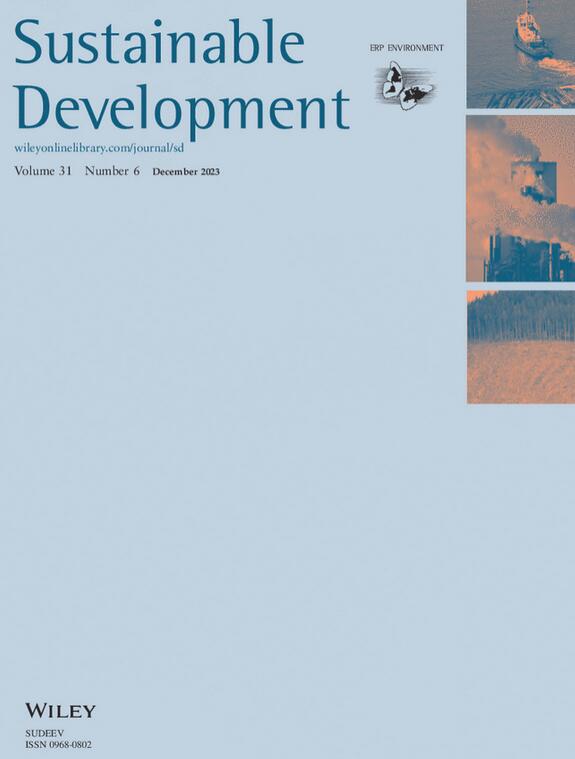Circular economy orientation from corporate social responsibility: A view based on structural equation modeling and a fuzzy‐set qualitative comparative analysis
IF 9.9
1区 环境科学与生态学
Q1 DEVELOPMENT STUDIES
引用次数: 0
Abstract
Seeking sustainable development, companies voluntarily implement Corporate Social Responsibility (CSR) through the Triple Bottom Line (TBL) approach, considering economic, social and environmental aspects of interest to global society. Searching for sustainable development, the Circular Economy (CE) emerged as a new philosophy of life to meet the new challenges in society. This research links CSR and CE but considering jointly the Institutional and Stakeholder Theories to delimit the sustainable development framework from the EC approach driven by CSR. According to this framework, it was tested whether the CSR practices of companies positively and significantly impacts on a business orientation towards CE, through two models (Model A and Model B) each of them analyzed with two independent samples of companies in Spain. Both samples are composed of Small and Medium Enterprises (SMEs) at two different stages of CSR adoption. The hypotheses were analyzed through a structural equation modeling‐fuzzy‐set qualitative comparative analysis (SEM‐fsQCA). The result of the SEM supports the hypothesis in both models. So, CSR practices are driving companies towards CE, incorporating propositions on stakeholders' value creation. Moreover, an fsQCA revealed combinations of relationships that ensure the consistency of obtained results, generating five configurations based on two models defined. Main contribution of this work is CSR practices of companies and their orientation towards CE can be linked. This encourages to deep in analysis about the relations between CE and CSR, and of the specific CSR practices that should be enhanced for their beneficial effect on the implementation of CE.从企业社会责任看循环经济导向:基于结构方程模型和模糊集定性比较分析的观点
为了寻求可持续发展,企业通过三重底线(TBL)方法自愿履行企业社会责任(CSR),考虑全球社会关心的经济、社会和环境问题。为了寻求可持续发展,循环经济(CE)作为一种新的生活哲学应运而生,以应对社会的新挑战。本研究将企业社会责任和循环经济联系起来,但同时考虑了制度理论和利益相关者理论,以便从企业社会责任驱动的循环经济方法中划分出可持续发展框架。根据这一框架,通过两个模型(模型 A 和模型 B),分别对西班牙的两家独立样本公司进行分析,检验了公司的企业社会责任实践是否会对企业的消费导向产生积极而显著的影响。这两个样本均由处于企业社会责任采纳两个不同阶段的中小企业(SMEs)组成。假设通过结构方程建模-模糊集定性比较分析(SEM-fsQCA)进行分析。SEM 的结果支持两个模型的假设。因此,企业社会责任实践正在推动企业走向消费电子化,并融入了利益相关者价值创造的命题。此外,FsQCA 揭示了各种关系组合,确保了所获结果的一致性,并根据所定义的两个模型产生了五种配置。这项工作的主要贡献在于,公司的企业社会责任实践和它们的企业价值创造导向可以联系起来。这有助于深入分析行政首长协调会与企业社会责任之间的关系,以及应加强哪些具体的企业社会责任实践,以对行政首长协调会的实施产生有利影响。
本文章由计算机程序翻译,如有差异,请以英文原文为准。
求助全文
约1分钟内获得全文
求助全文
来源期刊

Sustainable Development
Multiple-
CiteScore
17.30
自引率
11.20%
发文量
168
期刊介绍:
Sustainable Development is a publication that takes an interdisciplinary approach to explore and propose strategies for achieving sustainable development. Our aim is to discuss and address the challenges associated with sustainable development and the Sustainable Development Goals. All submissions are subjected to a thorough review process to ensure that our readers receive valuable and original content of the highest caliber.
 求助内容:
求助内容: 应助结果提醒方式:
应助结果提醒方式:


